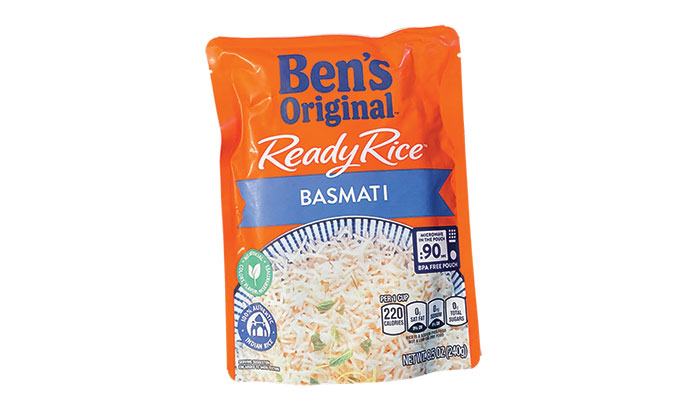The company has been operating in the Mississippi Delta for more than four decades, producing the widely recognized “Uncle Ben’s” rice products. But change is in the air, and Mars has listened and learned. After committing to a change that departed from the inequities associated with the name and face of the former brand, in May 2021 it debuted its new line of “Ben’s Original” products.
“Ben’s Original™ is not just a name and packaging change — we believe everyone deserves to feel welcome, heard and have access to nutritious food,” said Rafael Narvaez, Global CMO and R&D officer, Mars Food. “That’s why we’ve committed to taking actions based on insights from thousands of consumers, as well as our own associates, that are designed to enhance inclusion and equity in service of our new brand purpose to create meals, experiences and opportunities that offer everyone a seat at the table.”
“Today is a big moment for Ben’s Original™,” said Denis Yarotskiy, regional president, Mars Food North America. “We recognize we have much more work to do as we bring our new brand purpose to life to offer everyone a seat at the table. We remain committed to delivering this ambition.”
Yarotskiy shared his perspective with us, casting further light on the business climate for Mississippi’s food companies and the community’s role as a model location for such meaningful change.
Describe the company’s history of operations and continued investment in Mississippi.
Denis Yarotskiy: We are very proud of our 40-plus-year history in Greenville, Mississippi. The factory opened in 1978, producing only conventional brown rice. Now, it’s home to hundreds of different products across our Mars Food brands (including Ben’s Original and Seeds of Change) in a variety of formats for dry rice and ready-to-heat rice and grains.
Over the years, we have continued to invest in both operations at the site — leading it to be the largest Mars Food factory in the world — and the Greenville community, with much more to come as part of our $2.5 million commitment over the next five years to work toward an equitable future.
The site’s location in the heart of the Delta means that we are close to where the majority of our rice is sourced and have built longstanding relationships with farmers, collaborating on critical priorities like developing and implementing more sustainable rice farming practices. It also means that most of our rice products sold in North America pass through the Greenville facility. Our investments in the manufacturing site — more than $200 million over our 40-plus-year history — have allowed us to expand production, including increasing our capacity significantly in the last year following the installation of a state-of-the-art upgrade to our ready-to-heat line.
What are the Greenville area’s strengths and challenges in terms of regulatory/permitting environment, talent and skills, cost of doing business, logistics, infrastructure, supplier network, etc.?
Yarotskiy: We chose Greenville as the home of our only U.S. Mars Food factory for many reasons — importantly, its proximity to rice farms throughout the Delta and strong support from the community and the city of Greenville. We regularly collaborate with Mayor Errick D. Simmons office on a variety of topics, from infrastructure and site-related projects to pressing community needs and challenges.
When we began work on the Ben’s Original rebrand last year, we first engaged with the mayor’s office and key local stakeholders (elected officials and community thought leaders) who have been instrumental in helping us develop appropriate plans to evolve our global brand while focusing on the community in which we operate.
We will continue to work with the mayor and other partners (nonprofit and companies) as we solidify our plans to work toward an equitable future by enhancing educational opportunities for area students, as well as furthering access to healthier foods for area residents.
You have chosen the Greenville area to be the model for the company’s approach to inclusiveness and equity. Describe the deliberate process you have gone through since your brand change announced last June, and how you hope to roll things out in Mississippi and more broadly within Mars.
Yarotskiy: As part of our rebranding and to bring to life the brand purpose of creating opportunities that offer everyone a seat at the table, Mars Food committed to investing $2.5 million over the next five years in the local Greenville community to work toward an equitable future by enhancing educational opportunities for area students, as well as furthering access to healthier foods for area residents.
In January of this year, Kyla Washington joined our Corporate Affairs team as Mars Food’s first-ever Community Engagement Officer (based in Greenville). Kyla has deep roots in Greenville, Mississippi. She grew up in Greenville, attended Greenville Weston High School before attaining her bachelor’s degree from Mississippi State University and is currently working on her MBA in Public Administration at Belhaven University. Most recently, Kyla worked as the executive assistant and PR director for the City of Greenville, where she was key in ensuring an ongoing collaborative partnership between the city, Mayor Errick D. Simmons and Mars Food.
Since joining us, Kyla has been immersing in conversations and listening to the community, stakeholders and our Associates to determine the investment strategies that will positively and sustainably impact Greenville. She will continue to strengthen relationships with existing community partners — including Hearty Helpings Food Pantry, Boys and Girls Club of Washington County, Washington County Economic Alliance — and area junior colleges to upskill local talent, including training programs and job fairs.

